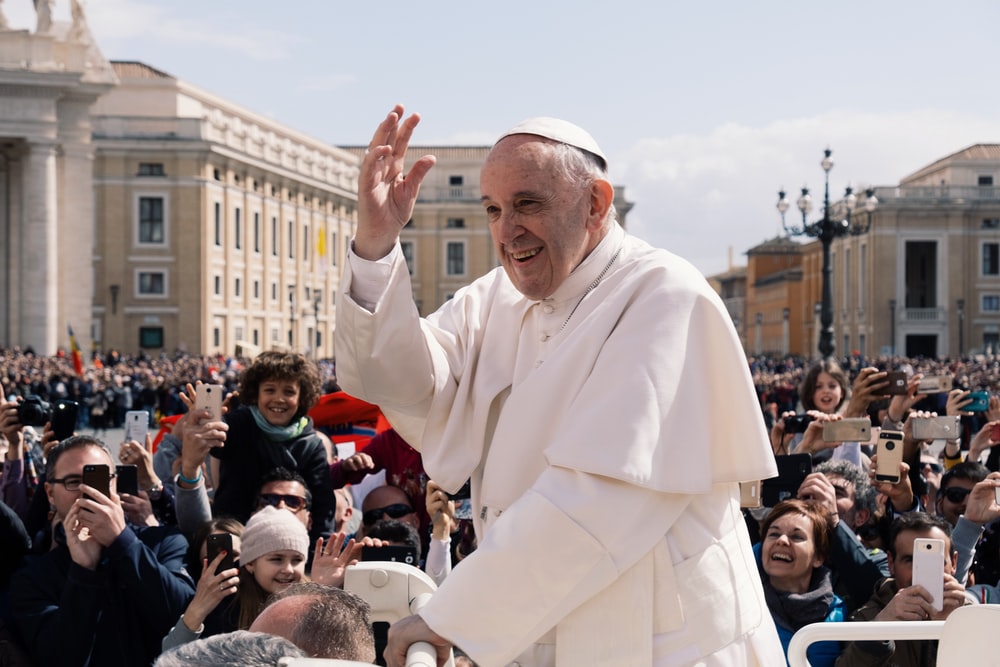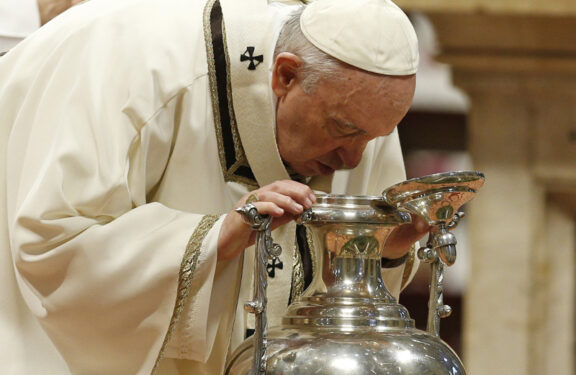Pope Francis breathes on chrism oil, a gesture symbolizing the infusion of the Holy Spirit
Pope Francis began Holy Week schedule on April 14 Thursday with the Chrism Mass.
On this occasion, he told the priests to watch out for several “idols” that put not only their own spiritual lives at risk but damage their ministry and relationship with their people. He began his homily quoting a passage from the day’s reading from the Book of Isaiah, which says, “You shall be called priests of the Lord; they shall speak of you as the ministers of our God… I will faithfully give them their recompense, and I will make an everlasting covenant with them.”
“There is no recompense greater than friendship with Jesus. There is no peace greater than his forgiveness. There is no greater price than his precious Blood, and we must not allow it to be devalued by unworthy conduct,” the pope said.
The Chrism Mass is traditionally devoted to the priesthood, and the bishop of a diocese blesses the sacred oils used in the church’s sacraments.
Speaking to the roughly 4,300 people gathered in St. Peter’s Basilica, around 1,800 of whom were priests, Pope Francis said the vocation of a priest is primarily for the benefit of their people and urged the church’s shepherds to keep their eyes “fixed” on Jesus.
“Fixing our eyes on Jesus is a grace that we, as priests, need to cultivate,” he said, insisting this must be done as an act of love and contemplation, but it should also be a time for entrusting God with the temptations faced in everyday life “so as to acknowledge them and reject them.”
“Perhaps, if we meet his gracious gaze, he will also help us to show him our idols,” the pope said, saying the act of showing God the “hidden idols” in one’s life “strengthens us against them and takes away their power.”
Through idols, one worships only themselves, he said, “for there, in those spaces we mark out as exclusively ours, the devil insinuates himself with his poison. He not only makes us self-complacent, giving free rein to one passion or nurturing another,” but uses those idols to replace the space reserved for God.
Even though one might insist that they know the difference between worshipping God and serving an idol, “in practice we take space away from the Trinity in order to give it to the devil, in a kind of oblique worship,” oftentimes without realizing, Francis said.
This, he said, is “the worship of one who quietly yet constantly listens to his talk and consumes his products, so that in the end not even a little corner remains for God.” Pope Francis stressed that idols are personal, and when they fail to be unmasked, “we make room for the Evil One.” He highlighted three different forms of “hidden idolatry,” which, he said, are often present in the life of a priest, weakening their relationship with God, and also with their people. The first is the temptation of “spiritual worldliness,” which he has often cautioned against.
Spiritual worldliness, he said, is “a proposal of life, a culture, a culture of the ephemeral, of appearances, of the cosmetic. Its criterion is triumphalism, a triumphalism without the cross.”
“Jesus prayed that the Father would defend us against this culture of worldliness,” he said, saying this attitude contradicts the logic of Jesus, who humbled himself on the cross and who is “is our sole remedy against every idol.”
“The worldly attitude of seeking our own glory robs us of the presence of Jesus, humble and humiliated,” who is close to everyone and who “suffers with all who suffer, who is worshiped by our people who know who his true friends are.”
“A worldly priest is nothing more than a clericalized pagan,” Pope Francis said. He also cautioned against the so-called “pragmatism of numbers,” which he said is manifested in a love for statistics and numbers that can “depersonalize every discussion and appeal to the majority as the definitive criterion for discernment.”
“This cannot be the sole method or criterion for the Church of Christ,” he said, insisting that people “cannot be ‘numbered,’ and God does not ‘measure out’ his gift of the Spirit.” With this obsession with numbers, the good of the people disappears and “we are really seeking ourselves, pleased with the control offered us by this way of thinking, unconcerned with individual faces and far from love,” Francis said.
The remedy, he said, is to forget oneself and let God take the lead. Francis also criticized what he said is the idol of “functionalism,” a mindset he said has “short shrift for mystery” and “aims at efficiency.” “Little by little, this idol replaces the Father’s presence within us,” he said, insisting that “God doesn’t simply ‘function’, but creates with love.” “Functionaries,” on the other hand, “take no delight in the graces that the Spirit pours out on his people, from which they too can be nourished like the worker who earns his wage.”
A priest who has a functionalist mindset “has his own nourishment, which is his ego,” the pope said, adding, “In functionalism, we set aside the worship of the Father in the small and great matters of our life and take pleasure in the efficiency of our own programs.” With both functionalism and the “pragmatism of numbers,” hope is eliminated, Francis said, and is replaced with “an attitude of vainglory on the part of the shepherd, an attitude that weakens the union of his people with God and forges a new idol based on numbers and programs.”
Hiding these idols and not knowing how to identify them in daily life “detracts from our fidelity to our priestly covenant and makes our personal relationship with the Lord become lukewarm,” he said. Jesus, he said, “is the only way to avoid being mistaken in knowing what we feel and where our heart is leading us…(he) forces these idols to show themselves, so that we can see their presence, their roots and the ways they operate, and allow the Lord to destroy them.”
Francis urged priests to be attentive to these mentalities, “lest the weeds of these idols that we were able to hide in the folds of our hearts may spring up anew.” He concluded by praying that St Joseph would “liberate us from every form of possessiveness, for possessiveness is the fertile soil in which these idols grow. May St Joseph obtain for us the grace to persevere in the arduous task of discerning those idols that we all too often conceal or that conceal themselves.”


